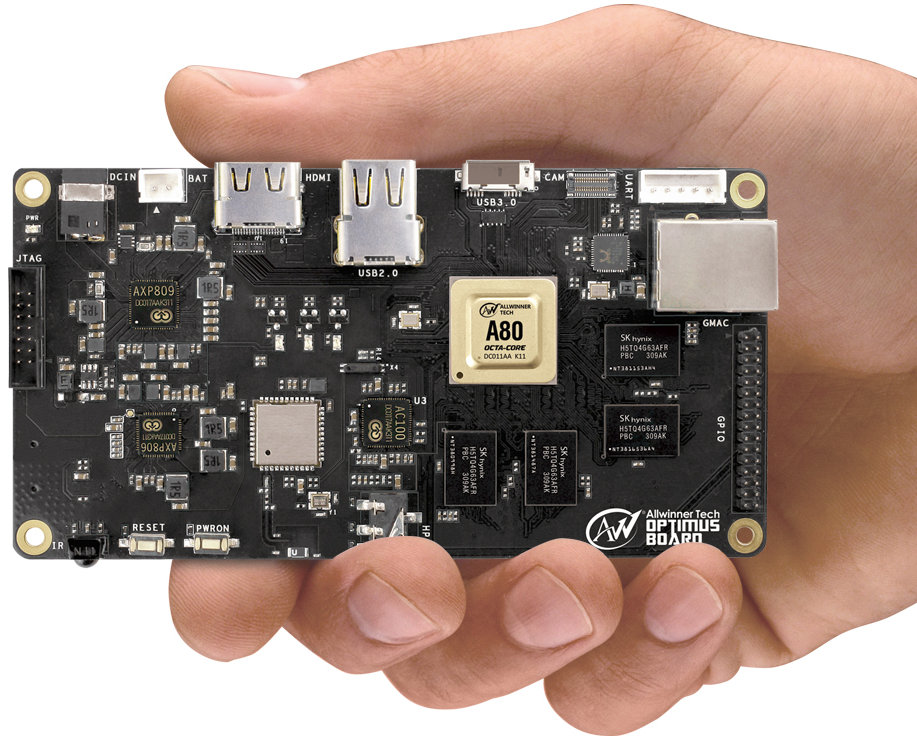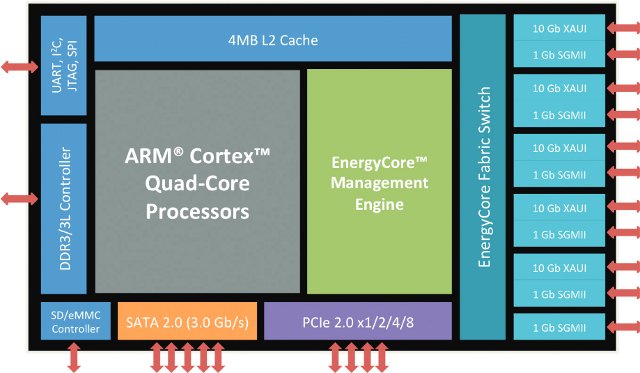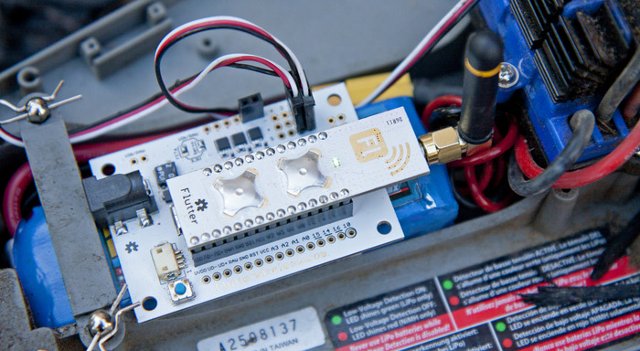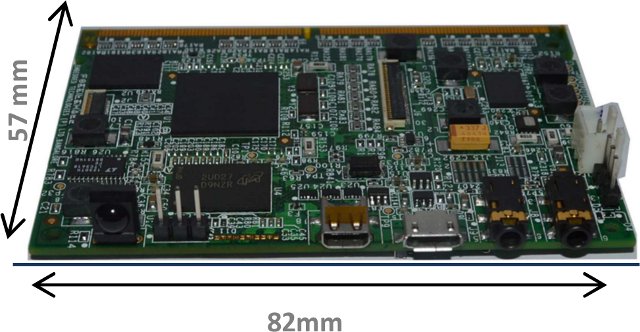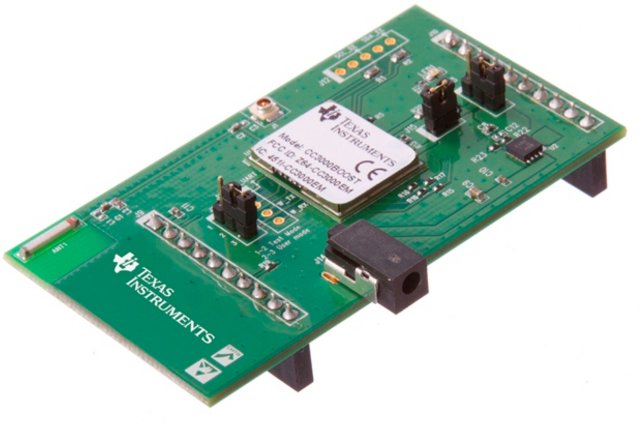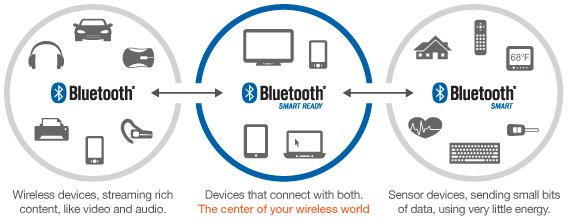CES 2014 is coming soon, and it will take place on 7 – 10 January, 2014, and we can expect some interesting SoC news. Samsung suggested they will unveil their 64-bit ARM SoC (Exynos 6?) at CES 2014, Nvidia will hold a press conference to “showcase new NVIDIA Tegra mobile technologies, gaming innovations, and advanced automotive display technologies”, and Qualcomm has been quiet for now. However, several Chinese SoC vendors, namely AllWinner, Rockchip, and Mediatek, have already announced what they will showcase at CES 2014, albeit with few details. AllWinner at CES 2014 Allwinner announced will showcase their OptimusBoard based on their Ultra Octa-Core A80 SoC, as well as 4G tablets powered by Allwinner A31/A31s, and dual-SIM phablets sporting A23 dual-core. Allwinner A80 is an Octacore processor featuring four ARM Cortex A7 cores, and four Cortex A15 cores @ 2.0GHz together with an unnamed GPU offering 2x more performance over previous […]
ARM Based Servers and Servers-on-a-Chip (SoCs) at ARM Techcon 2013
ARM Techcon 2013 took place on October 29 – 31, 2013, in Santa Clara, and several companies announced servers, or chips for server based on ARM technology. None of those are for home used, but for now ARM based servers target enterprise and cloud data. Yet end users may them indirectly when they access social networks such as Facebook, or other online services such as Paypal. Calxeda ECX-2000 SoC After their ECX-1000 quad core Cortex A9 Server-on-chip, Calxeda has announced ECX-2000 SoC featuring four Cortex A15 cores. The new SoC provides about twice the performance, 3 times the memory bandwidth, and 4 times the memory capacity (up to 16GB RAM) of the earlier chip. One of the key advantage of Cortex A15 over Cortex A9 is hardware virtualization that allows support for KVM and Xen hypervisors. ECX-2000 is supported in Canonical Ubuntu Linux 13.10 and can run Havana Openstack. Other […]
Linaro 13.08 Release With Linux Kernel 3.11 and Android 4.3
Linaro 13.08 has been released with Linux Kernel 3.11-rc6 (stating), Kernel 3.10.9 (LSK – beta), and Android 4.3. This month is the first release based on Android 4.3, which was only pushed to AOSP at the end of last month. I can also see work on new SoCs/hardware this month with Texas Instruments Keystone II ARM Cortex A15+DSP SoC and Fujitsu AA9 board (Which processor?, I could not find out). A lot of work also appears to have gone in OpenEmbedded, further optimizations have gone into NEON optimized AES encryption in OpenSSL, and more. It’s also the first time I can see a Ubuntu Raring engineering build image for HighBank (Calxeda Energycore). Here are the highlights of this release: Android Engineering Android stack was tuned to achieve 100% CTS pass result on Android 4.3 Analyzing the UEFI EDK II boot loader for Android completed, implementation of fastboot application and USB […]
$25 Flutter is a Wireless Arduino compatible Board with Up to 1 km Range
There are already several ways to add wireless connectivity to your hardware project. For short ranges, we can use protocols such as Bluetooth (e.g. RFDuino, BLEDuino projects, or Bluetooth USB dongle), for much longer ranges 3G/4G connectivity may be required, and achievable via a 3G/4G USB dongle, or SparqEE CELLv1.0 project for example. But what if you want something in the middle with a range closer to 1km? Flutter boards using the 915MHz band (US only) can provide such range, and are software compatible with the Arduino. There are two version of the board: Flutter Basic – Board with an low-profile integrated antenna. It features micro USB for power, an LED, and a button, as well as several digital and analog I/O. Flutter Pro – Board with external antenna (and probably longer range). It comes with all features found in Flutter Basic, and adds battery charging, an additional button, and […]
Texas Instruments Releases Android App for SensorTag and Publishes Bluetooth Low Energy Training Videos
Texas Instruments Sensortag is a Bluetooth Low Energy (BLE) development kit with 6 sensors (IR temperature, humidity, pressure, accelerometer, gyroscope, magnetometer) mainly destined at mobile application, which I recently tried in Linux. Until now, only it was only officially supported in iOS and Windows, but a few days after the release of Android 4.3 which adds Bluetooth Low Energy support, Texas Instruments quickly worked to release an Android App for their BLE devkit. The annoying part is that the Android app is only available as a Windows executable (SensorTagAndroidApp-0_9_0-windows-installer_2.exe), so you’ll have not choice but to use Windows to uncompress the files. Yet the installation goes as follows: Copy the SensorTag.apk file (SensorTag_0_9_0.apk) to your Android 4.3 device Enable installation of apps from unknown sources (Settings -> Security -> Device Administration -> Unknown Sources) Open file manager and launch, locate the .apk file and install the app by clicking the […]
FossilShale FS-DM385-SOM Features TI DaVinci SoC for HD Media applications
FossilShale, an embedded company based in Bangalore, has announced a system-on-module based on Texas Instruments Davinci TMS320DM385 SoC that targets applications high-definition decoding and encoding (up to 1080p60) such as IP Cameras, HD video conferencing endpoints, digital signage, portable medical imaging and diagnostics, or camcorders. It can be used standalone for evaluation, or with a carrier board. FS-DM385-SOM Specifications: SoC – Texas Instruments TMS320DM385F ARM Cortex A8 core @ 1GHz with HDVICP v2 video core handling H.264 BP/MP/HP, MPEG2, VC1, MPEG4 SP/ASP, JPEG/MJPEG encoding and decoding. Memory – 1GB DDR3 Storage – 512MB NAND flash +1x Micro SD/MMC connector (up to 32GB) Audio / Video: 1x HDMI Out (Micro) 1x LCD TFT Interface (24 Bit RGB) 1x Camera Interface (MIPI) 1x Integrated Composite Video In & Audio Line In(Stereo Jack) 1x Integrated Composite Video Out & Audio Line Out(Stereo Jack) Other Interfaces: 1x USB OTG 1x IrDA Accelerometer 1x I2C, 1x SPI […]
Texas Instruments Introduces SimpleLink Wi-Fi CC3000 BoosterPack
Texas Instrument launched SimpleLink Wi-Fi CC3000 in Q1 2012 in order to bring WiFi connectivity to any device including 8-bit or 16-bit MCU, as CC3300 internally handled all networking tasks, and exchange data with the MCU via an SPI interface. This Wi-Fi processor allows to use Wi-Fi for data transmission for the Internet of Things, and offers much better battery than other system relying on software to handle network traffic. Today, the company has just announced SimpleLink Wi-Fi CC3000 BoosterPack, a low cost evaluation platform that works with both MSP430 and Tiva C Series LaunchPad evaluation kits, and sells for $35. SimpleLink Wi-Fi CC3000 BoosterPack features and benefits as seen in the press release: SmartConfig technology: One-step Wi-Fi configuration using smartphones, tablets or PCs Easy network setup for display-less (headless) devices Simultaneous multiple device provisioning iOS, Android and Java sample applications available Royalty-free software Flexible memory size – Small memory foot print […]
Bluetooth Versions Walkthrough, and Bluetooth 4.0 Low Energy Development Resources
I’ve seen more and more Bluetooth 4.0 LE devices in the last few months including RFDuino, Wimoto Motes, TI SensorTag, and Scadanu Scout, so I thought it would be good to write a bit about Bluetooth. First, I’ll write about the different version of Bluetooth, since I was still confused with the practical implications between the versions, and then I’ll show some development kits and software resources to play around and/or develop Bluetooth 4.0 LE applications both on devices and hosts. Bluetooth Versions Bluetooth v1.0 and v1.0B The Bluetooth 1.0 Specification was released in 1999, and according to an entry in Wikipedia, 1.0 and 1.0B devices had many issues, mainly interoperability issues. You won’t find any Bluetooth 1.0 device today. Bluetooth v1.1 Bluetooth v1.1 was ratified as IEEE Standard 802.15.1-2002 in 2002. It fixed many issues found in the previous specifications, added the option to use non-encrypted channels, as well […]


